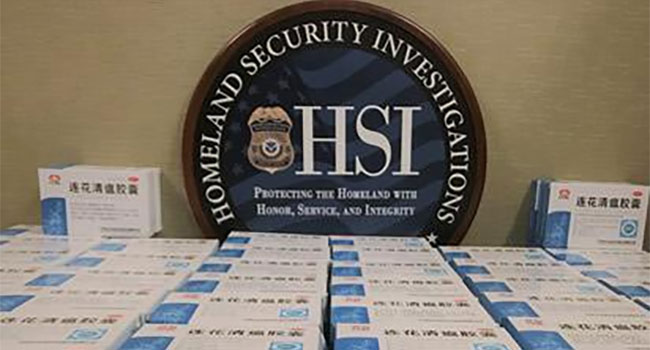
ICE HSI Baltimore Seizes Over 14,000 Unapproved COVID-19 Treatment Capsules, Several Unapproved Test Kits
Immigration and Customs Enforcement (ICE), Homeland Security Investigations (HSI) Baltimore special agents and Maryland law enforcement partners have seized over 14,000 unapproved COVID-19 treatment capsules and several unapproved COVID-19 test kits as part of ongoing Operation Stolen Promise investigations. Operation Stolen Promise is a national operation aimed at combatting COVID-19 fraud and other related criminal activity. The operation enhances collaboration with multiple federal agencies, along with business and industry representatives. Surging criminal activity surrounding the COVID-19 pandemic requires an equally robust investigative response to protect the American public.
HSI Baltimore has been actively leveraging investigative resources and partnerships to intercept fraudulent products before they can enter our community. In one seizure, HSI Baltimore, Customs and Border Protection and Maryland Natural Resources Police intercepted and seized a shipment that originated in China and contained unapproved COVID-19 test kits. In another case, HSI and the Postal Inspection Service intercepted a package originating in Hong Kong and discovered nearly 500 unapproved COVID-19 treatment capsules.
“In uncertain times, criminals often take advantage of fear and anxiety, hawking fraudulent cures out of greed and disregard for your wellbeing. If it seems too good to be true, it probably is,” said John Eisert, HSI Baltimore Special Agent in Charge. “There are no approved test kits that you can get without going to your doctor and cures being sold online not only delay your trip to the doctor for proper care, but their ingredients can cause more harm. HSI Baltimore stands with our law enforcement partners at Customs and Border Protection, the Postal Inspection Service and local law enforcement to investigate and seize these bogus products and keep the public safe.”
“Panic-stricken consumers and predatory scammers continue to purchase unproven coronavirus pharmaceuticals and counterfeit protective and diagnostic equipment that pose a serious health threat to American consumers,” said Ronald Stanley, CBP’s acting director of field operations in Baltimore. “Customs and Border Protection will continue to work with Homeland Security Investigations and our consumer safety partners to identify and seize these potentially hazardous medical products before they could harm American consumers.”
“The U.S. Postal Inspection Service will not allow the U.S. Mail to be used in furtherance of scams intended to mislead our consumers”, said Peter R. Rendina, Inspector in Charge of the U.S. Postal Inspection Service, Washington Division. “For 245 years the Postal Service has been delivering trust to the American people while Postal Inspectors have been delivering justice to fraudsters. We will continue working with our federal, state and local partners to make sure we stop these greedy scammers from taking advantage of our nation during this pandemic.”
Criminal organizations that have historically engaged in financial scams are pivoting to exploit the coronavirus pandemic and the associated stimulus package for illegal financial gains. These networks are smuggling and selling counterfeit safety equipment and prohibited testing kits, medicines, and hygiene products, as well as running illicit websites to sell their merchandise. In the coming weeks, HSI anticipates that financial fraud scams involving financial relief, COVID-19 stimulus checks, and traditional boiler room criminal operations will increase. All these fraud scams impact and burden government public benefit agencies that are in the process of distributing aid and providing assistance.
As of June 1, HSI special agents nationally have opened over 480 investigations nationwide; seized over $4.9 million dollars in illicit proceeds; made 20 arrests; executed 38 search warrants; analyzed over 36,000 COVID-19 domain names; and worked alongside U.S. Customs and Border Protection to seize 668 shipments of mislabeled, fraudulent, unauthorized or prohibited COVID-19 test kits, treatment kits, homeopathic remedies, purported anti-viral products and personal protective equipment.